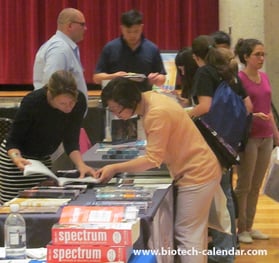Dr. Madelaine Bartlett, a biologist at the University of Massachusetts in Amherst, recently received a four-year $4 million grant from the National Science Foundation. The new research funding will allow Barlett and colleagues from UMass and other institutions to study the genes that regulate plant stem cell biology and their effect on fruit size and yield.
The research collaboration will be led by principal investigator David Jackson of Cold Spring Harbor Laboratory in New York. Earlier studies led by the Jackson lab showed that fruit yield in corn can be enhanced by weak alleles of a gene in the CLAVATA gene network. In the new study, researchers will build on those results; this time focusing not only on corn, but also on tomatoes and the model plant Arabidopsis thaliana.
One of the team's major goals is to speed up the mutation process of these plants, according to UM's Barlett. “Instead of waiting for the next thousand years to see what new mutations arise in these genes, we will accelerate evolution in a very controlled and intelligent way to create genetic diversity for use by traditional plant breeders,” she explained in an article for UMass Amherst News.
She adds, “All the plants we eat have been domesticated, that is, selected by ancient farmers to be more convenient to grow and to yield more food. Because of all we know about how evolution works, we’ll use the same tools that nature does to create new genetic diversity.”
(Image of corn courtesy of Wikimedia Commons)
The earlier findings from Jackson and colleagues strongly suggested that during the domestication of tomatoes and corn, some CLAVATA network gene variants were selected. These genes led to larger tomatoes and greater corn yields, and once farmers noticed these two trends, the variants continued to be passed along. Researchers now know that the genes in both cases are in the same network.
The Bartlett lab’s role in the new study will be to discover the evolutionary history of the CLAVATA network and how its genes are regulated. The goal is to experimentally create genetic diversity for crop breeders, so that they no longer need to wait for mutations such as these to randomly occur. As Bartlett explained, "We will be like those ancient farmers except we are using more modern tools. From our work, somebody in the future will be able to give plant breeders access to variants they might be interested in for growing bigger fruit and more fruit.”
Researchers in the Barlett lab will use a CRISPR/Cas9 multiplex knockout strategy to make semi-random mutations across gene regulatory sequence regions. Then they will screen these to recover weak alleles with enhanced traits.
Biotechnology Calendar, Inc. produces an annual life science trade show event at University of Massachusetts, Amherst that brings researchers face-to-face with laboratory suppliers.
The 3rd Annual BioResearch Product Faire™ at the University of Massachusetts will be held on July 12th, 2017.
Life science professionals are invited to attend the annual on campus trade fair
for free to view the latest lab supplies and technology. Click the button below for additional information or to pre-register.

If you are a laboratory equipment supplier, this is an excellent opportunity to meet face-to-face with life science researchers and educate them about your lab or chemical supply products. Call us at 530-272-6675 or click on the following link to reserve a space and increase your scientific sales in 2017.
Related UMass Articles:
UMass Harvests $1.5M from USDA for Food Science Bioresearch
Research Grant to UMass to Help Uncover How the Brain Works



